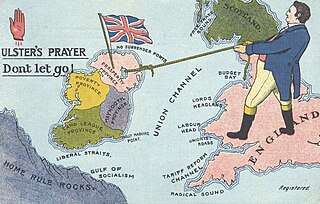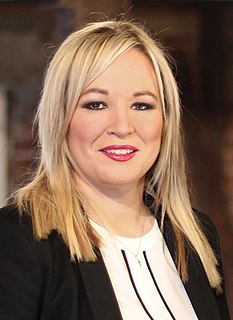Related Research Articles

The Ulster Unionist Party (UUP) is a unionist political party in Northern Ireland. The party was founded in 1905, emerging from the Irish Unionist Alliance in Ulster. Under Edward Carson, it led unionist opposition to the Irish Home Rule movement. Following the partition of Ireland, it was the governing party of Northern Ireland between 1921 and 1972. It was supported by most unionist voters throughout the conflict known as the Troubles, during which time it was often referred to as the Official Unionist Party (OUP).

The Parliament of Northern Ireland was the home rule legislature of Northern Ireland, created under the Government of Ireland Act 1920, which sat from 7 June 1921 to 30 March 1972, when it was suspended because of its inability to restore order during The Troubles, resulting in the introduction of Direct Rule. It was abolished under the Northern Ireland Constitution Act 1973.

Northern Ireland is one of the four countries of the United Kingdom,, situated in the north-east of the island of Ireland. It was created as a separate legal entity on 3 May 1921, under the Government of Ireland Act 1920. The new autonomous Northern Ireland was formed from six of the nine counties of Ulster: four counties with unionist majorities – Antrim, Armagh, Down, and Londonderry – and two counties with slight Irish nationalist majorities – Fermanagh and Tyrone – in the 1918 General Election. The remaining three Ulster counties with larger nationalist majorities were not included. In large part unionists, at least in the north-east, supported its creation while nationalists were opposed.

Unionism is a political tradition on the island of Ireland that favours political union with Great Britain and professes loyalty to the British Crown and constitution. As the overwhelming sentiment of Ireland's Protestant minority, following Catholic Emancipation (1829) unionism mobilised to keep Ireland part of the United Kingdom and to defeat the efforts of Irish nationalists to restore a separate Irish parliament. Since Partition (1921), as Ulster Unionism its goal has been to maintain Northern Ireland as part of the United Kingdom and to resist a transfer of sovereignty to an all-Ireland republic. Within the framework of a 1998 peace settlement, unionists in Northern Ireland have had to accommodate Irish nationalists in a devolved government, while continuing to rely on the link with Britain to secure their cultural and economic interests.
The Alliance Party of Northern Ireland (APNI), or simply Alliance, is a liberal and centrist political party in Northern Ireland. As of the 2022 Northern Ireland Assembly election, it is the third-largest party in the Northern Ireland Assembly, holding seventeen seats, and has made recent breakthroughs to place third in first preference votes in the 2019 European Parliament election and third highest-polling regionally at the 2019 UK general election. The party won one of the three Northern Ireland seats in the European Parliament, and one seat, North Down, in the House of Commons, the lower house of the Parliament of the United Kingdom.
Arthur Brian Deane Faulkner, Baron Faulkner of Downpatrick,, was the sixth and last Prime Minister of Northern Ireland, from March 1971 until his resignation in March 1972. He was also the chief executive of the short-lived Northern Ireland Executive during the first half of 1974.

The Vanguard Unionist Progressive Party (VUPP), informally known as Ulster Vanguard, was a unionist political party which existed in Northern Ireland between 1972 and 1978. Led by William Craig, the party emerged from a split in the Ulster Unionist Party (UUP) and was closely affiliated with several loyalist paramilitary groups. The party was set up in opposition to power sharing with Irish nationalist parties. It opposed the Sunningdale Agreement and was involved in extra-parliamentary activity against the agreement. However, in 1975, during discussions on the constitutional status of Northern Ireland in the constitutional convention, William Craig suggested the possibility of voluntary power sharing with the nationalist Social Democratic and Labour Party. In consequence the party split, with dissenters forming the United Ulster Unionist Party. Thereafter Vanguard declined and following poor results in the 1977 local government elections, Craig merged the remainder of Vanguard into the UUP in February 1978.
The Northern Ireland peace process includes the events leading up to the 1994 Provisional Irish Republican Army (IRA) ceasefire, the end of most of the violence of the Troubles, the Good Friday Agreement of 1998, and subsequent political developments.

The Northern Ireland Labour Party (NILP) was a political party in Northern Ireland which operated from 1924 until 1987.

The Irish Unionist Alliance (IUA), also known as the Irish Unionist Party, Irish Unionists or simply the Unionists, was a unionist political party founded in Ireland in 1891 from a merger of the Irish Conservative Party and the Irish Loyal and Patriotic Union to oppose plans for home rule for Ireland within the United Kingdom of Great Britain and Ireland. The party was led for much of its existence by Colonel Edward James Saunderson and later by William St John Brodrick, Earl of Midleton. In total, eighty-six members of the House of Lords affiliated themselves with the Irish Unionist Alliance, although its broader membership was relatively small.

Naomi Rachel Long MLA is a Northern Irish politician who has served as Minister of Justice in the Northern Ireland Executive since January 2020 and leader of the Alliance Party since 2016. She has served as a Member of the Legislative Assembly (MLA) for Belfast East since 2020.
Sheelagh Mary Murnaghan, was an Ulster Liberal Party Member of Parliament (MP) in the House of Commons of Northern Ireland at Stormont.
Events during the year 1924 in Northern Ireland.
Albert Horatio McElroy was a minister of religion and politician in Northern Ireland.

The 2022 Northern Ireland Assembly election was held on 5 May 2022. It elected 90 members to the Northern Ireland Assembly. It was the seventh assembly election since the establishment of the assembly in 1998. The election was held three months after the Northern Ireland Executive collapsed due to the resignation of the First Minister, Paul Givan (DUP), in protest against the Northern Ireland Protocol.
The Liberal Party of Ireland, sometimes also referred to as the Irish Liberal Party, was a minor political party in Ireland, formed in 1967 and lasting briefly until roughly 1969.
References
- ↑ Illingworth, Ruth (2019). Sheelagh Murnaghan: Stormont's only Liberal MP. Ulster Historical Foundation. pp. 13, 24.
- ↑ Phoenix, Eamon (5 June 2014). "From Orangeman to republican envoy". Irish News. Archived from the original on 24 April 2021. Retrieved 14 December 2020.
- ↑ "Ulster Liberals", Manchester Guardian , 1 March 1928, p.8
- ↑ "Ulster's General Election", Manchester Guardian , 15 April 1929, p.14
- 1 2 3 Fionnuala O'Connor, "Pride of the Ulster Liberals", The Guardian , 16 September 1993
- ↑ Illingworth, Ruth (2019). Sheelagh Murnaghan: Stormont's only Liberal MP. Ulster Historical Foundation. pp. 26, 66.
- ↑ Illingworth, Ruth (2019). Sheelagh Murnaghan: Stormont's only Liberal MP. Ulster Historical Foundation. p. 63.
- ↑ Abstracts on Organisations – 'U' Archived 22 February 2011 at the Wayback Machine , CAIN Web Service
- ↑ "Ulster Liberal Party". The Political Companion (8): 53. July–September 1971.
- ↑ "Ulster Liberal Party". The Political Companion (32): 64. Spring 1982.